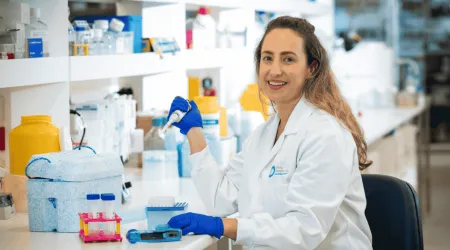Should colon cancer patients get the COVID-19 vaccine booster shot?
Dr. John Marshall, Chief of the Division of Hematology/Oncology at Medstar Georgetown University Hospital, joins the Alliance to answer common questions about the COVID-19 vaccines among the colon cancer and rectal cancer patient population.
First, should colon cancer or rectal cancer patients get vaccinated if they haven't already?
"For sure, essentially everybody should get vaccinated with the COVID-19 vaccine if you haven’t already. In particular, colorectal cancer patients should be vaccinated. Colorectal cancer patients are not that immuno-suppressed. The COVID-19 vaccine is a safe vaccine to administer. And as we have seen, it is incredibly effective at preventing serious illness, even from variants. Whether you are on active treatment or have had treatment in the past, all colorectal cancer patients should be vaccinated."
Should vaccinated colorectal cancer patients get the COVID-19 booster shot?
"I have to say I’m a little ambivalent about that. From a global perspective, I think it’s a much more important use of vaccines for those who have not been vaccinated to receive their first dose than those who have been vaccinated to receive our third dose. Colorectal cancer patients are not particularly vulnerable, for the most part, to COVID than other patient populations that are out there.
That being said, I’m not discouraging our patients from getting a third booster dose if you have not received one yet. We’re still learning what the best timing for that is, so I’m not urgent about it with my patients. But I am saying that if you have one available, and you’re OK otherwise, then sure, getting that third booster dose is OK with me."
Can the initial vaccine shots or booster shot harm treatment progress?
"Right now, there is nothing that we know of about getting the vaccine that will in any way interfere with someone's treatment. We do want to time the vaccine around, say, chemotherapy or steroids for the vaccine to have a maximum benefit on the immune system. Timing may be important, but in no way do we have any sense that the vaccine interferes with treatment for colorectal cancer."
What if a patient has been told by their doctor not to get vaccinated?
"It is unclear to me what every doctor is saying out there to their own patients about getting the vaccine or not. Certainly at our institution, we are all recommending vaccines for essentially everyone in the appropriate age group and diagnosis category. We have all been vaccinated as physicians.
If your physicians tell you to not get vaccinated, you may want to dig into why that is. Is it something about your current medical condition? Or it is possible that your physician carries some bias against vaccination in your setting. Do question that if your physician is suggesting you should not be vaccinated."
Top resources

Where breakthroughs begin: Project Cure CRC spotlight on Dr. Lisa Mielke
hrough Project Cure CRC, the Alliance is fueling bold, early-stage research with the potential to transform colorectal cancer treatment. Dr. Lisa Mielke’s groundbreaking work explores how the gut’s immune system and nerve signaling influence cancer growth—opening the door to new therapeutic approaches, including repurposed existing drugs. This is what’s possible when promising ideas get the support they need to move forward.

John E.: Biomarker testing uncovered a pivotal treatment option
After a grim prognosis, biomarker testing revealed a targeted treatment option for John E. Learn how knowing your biomarkers can change what’s possible.

"Clinical trials gave us time": A daughter’s tribute to her mother’s courage
When Kate Shin’s mother faced rectal cancer, clinical trials gave them precious time together. Now, Kate shares her story to encourage access to screening and innovative care, including clinical trials.





